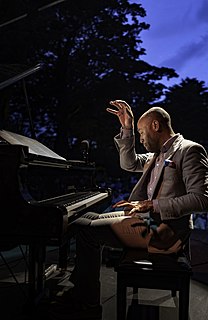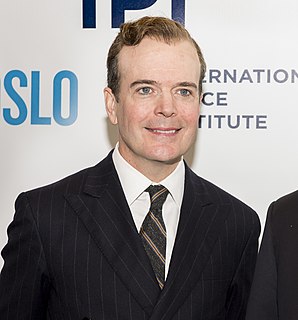A Quote by Donald Barthelme
His examiner said severely: "Baskerville, you blank round, discursiveness is not literature."
"The aim of literature," Baskerville replied grandly, "is the creation of a strange object covered with fur which breaks your heart."
Related Quotes
Only one American has given his life for Iranian democracy. He was a young idealist from Nebraska named Howard Baskerville. In 1907, fresh out of Princeton, Baskerville went to Iran as a schoolteacher. He found himself in the midst of a revolution against tyranny, and was carried away with passion for the democratic cause.
My grandfather, Arthur Baskerville, he played and still plays a little bit piano and trombone, and so when I was a kid, I always heard jazz around the house, but I also went to his gigs, whether it be a Saturday brunch in my hometown Columbus, Ohio. We'd go and hear him play with some of the local musicians.
Literature, real literature, must not be gulped down like some potion which may be good for the heart or good for the brain—the brain, that stomach of the soul. Literature must be taken and broken to bits, pulled apart, squashed—then its lovely reek will be smelt in the hollow of the palm, it will be munched and rolled upon the tongue with relish; then, and only then, its rare flavor will be appreciated at its true worth and the broken and crushed parts will again come together in your mind and disclose the beauty of a unity to which you have contributed something of your own blood.
Literature cannot develop between the categories "permitted"—"not permitted"—"this you can and that you can't." Literature that is not the air of its contemporary society, that dares not warn in time against threatening moral and social dangers, such literature does not deserve the name of literature; it is only a facade. Such literature loses the confidence of its own people, and its published works are used as waste paper instead of being read. -Letter to the Fourth National Congress of Soviet Writers
Christ and the life of Christ is at this moment inspiring the literature of the world as never before, and raising it up a witness against waste and want and war. It may confess Him, as in Tolstoi's work it does, or it may deny Him, but it cannot exclude Him; and in the degree that it ignores His spirit, modern literature is artistically inferior. In other words, all good literature is now Christmas literature.
Part of my methodological approach is made explicit when I discuss ways in which literature can have philosophical significance. Literature doesn't typically argue - and when it does, it's deadly dull. But literature can supply the frame within which we come to observe and reason, or it can change our frame in highly significant ways. That's one of the achievements I'd claim for Mann, and for Death in Venice.






































